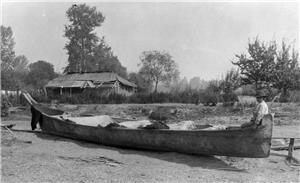In 1825, Suquamish Chief Kitsap (d. 1860) defeats a force of Cowichan raiders on Dungeness Spit. The Cowichans as well as other tribes of Vancouver Island and the Northwest Coast routinely attack Native American settlements to the south to capture slaves and to kill. These incursions will continue through the 1850s. This and other battles establish Kitsap as a major leader among the Suquamish.
The Native Americans of Puget Sound suffered regularly from raids by hundreds of Northern Indians who paddled their canoes from Vancouver Island. They captured slaves to serve them and to trade. The sight of dozens of large canoes was enough to send the Suquamish, S'Kallam, Duwamish, Nisqually and other tribes fleeing into the forest. These attacks were responsible for the destruction of several villages in what would become Ballard and north Lake Union.
In about 1825 (the date fixed by Dr. William Tolmie of the Hudson's Bay Company and relayed to Kitsap County Sheriff Theodore O. Williams [1827-1909]), Kitsap organized the various tribes along Puget Sound who were weary of the raids. They launched as many as 200 canoes and paddled to Vancouver Island near the future Victoria. Kitsap's forces methodically enveloped every Cowichan camp they could find, but the males of military age were missing. On Kitsap's orders, all the old people were killed and the young women and children were taken captive.
The Puget Sound flotilla crossed the Straits of Juan de Fuca to Dungeness Spit in a fog. On nearing shore they heard Indians singing war songs. When the fog lifted Kitsap discovered the Cowichans, who were celebrating a successful expedition. Kitsap landed his forces and in full view of the Cowichans, killed all his captives. The Cowichans returned the sentiment by killing their captives.
The two sides then joined battle and Kitsap carried the day establishing him as the most powerful chief on Puget Sound. Theodore Williams heard this story from Dr. Tolmie and from a number of Indians on the Port Madison Reservation.
Historian Elwood Evans had a different view of Kitsap, regarding him as a "medicine man" rather than a military leader. Kitsap allegedly derived his authority and power from his ability to heal himself of several serious wounds received in battle.
Territorial Governor and Superintendent of Indians Isaac Stevens (1818-1862) held a third view of Kitsap. In 1856, at the time of the Indian War, he informed U.S. Army Colonel George Wright that Stevens would not accept the surrender of Kitsap, Leschi, Nelson, and Quiemuth. Local settlers thought more of Kitsap and in 1857 named their new county after him.

